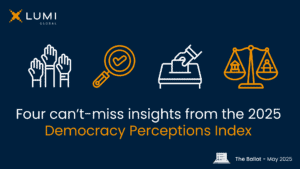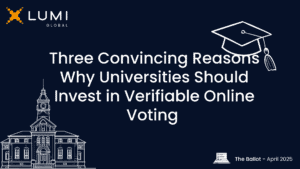Today, when we think of or see news about “politics,” it is very often only national politics. However, in spite of local elections and democratic processes having more of an immediate effect on voters’ lives, citizens often do not participate in them. In order to ensure the vibrancy of democracy, it is critical that citizens are truly involved in their communities at all possible tiers. In this article, we hope to shed light on what makes up grassroots democracy, why exactly it is important, and what we can do to support it.
From the bottom up
If you take a look at your passport, the first item which catches your eye will undoubtedly be the country name printed on the front. You are in fact a citizen of that country and hold the rights which come with being one. Now, check the cards in your wallet. You will likely see a number of other things: the town where you live, the region which issued your driver’s license, the local supermarket at which you shop, and so forth. Although we place great emphasis on our national citizenships, especially given the rights we enjoy in democratic countries, we are also citizens at levels below the national level. And, as with national citizenship, each of these levels confer on us the rights to shape how the city, county, or region we live in will look like through participating in democratic processes. To offer an example, while we may not be able to directly talk to national politicians about their economic policies, we can attend town hall meetings and form action groups to push for changes to trash pick-up times, transportation, and other things which affect our day-to-day lives in our local communities.
Back in 2000 when American professor Robert Putnam published his book Bowling Alone, his hope was that, by 2010, “many more” of his fellow US citizens would “participate in the public life of [their] communities.” These ways of participating could include “running for office, attending public meetings, serving on committees, campaigning in elections, and even voting.” The reason why Putnam wrote his book, and why he expressed such a desire for more citizen engagement, was because he had witnessed how membership in civic organizations – whether in social clubs, parent-teacher associations, or even bowling leagues – in his country had declined heavily in the late 20th century. Reasons for the decline in participation aside, his point was that this move towards isolation from one’s local community was not only bad for citizens, but bad for democracy itself since. Lower community engagement also seemed to lead to fewer people organizing around their interests, participating in town hall meetings, or voting.
Naturally, when citizen involvement in democratic institutions declines, the quality of democracy declines as well. Even in countries where voter turnout in national elections is high, democracy still suffers from a crisis of disengagement, as citizens are rarely getting involved in democratic processes beyond voting, such as running for office or being involved members of political parties. This can in turn lead to further division in society, inequality between representatives and the represented, and the degradation of democracy. Seeing as how we possess local citizenship as well, and that democracy itself started locally as a system of government within smaller Greek city-states, the solution to these issues may in fact begin in our local democracies.
Building Social Capital Outside of the “Imagined Community”
While many of us feel attachment to our national identities, this is a fairly recent phenomenon. As argued by Benedict Anderson in his groundbreaking work Imagined Communities, what we now know as “nation-states” and the nationalism which upholds them did not exist until the 1800s at the earliest and are upheld by nations which are “imaginary.” Here, “imaginary” does not mean fake, but rather only possible to visualize in one’s head since it is not possible to know all members of a nation personally. National-level politics is something underpinned by this “imaginary” community, as we know there are other citizens who also vote or run for office in our country even if we will never meet them. This national community is certainly important, forming a unit through which we can interact with other nations around the world, but we unfortunately cannot build relationships with most members in this community even if we wanted to do so.
What does this mean for democracy? It does not mean that our “imagined” nation-states cannot be prosperous democracies with members holding similar values. But what it does mean is that ultimately it is not possible to accumulate social capital, a fundamental element of a democratic mindset, at a level in which you do not and cannot know all of your fellow citizens. Social capital, defined as “connections among individuals – social networks and the norms of reciprocity and trustworthiness that arise from them,” is recognized as something which positively affects the quality of democracy. However, as put by Putnam, “a society of many virtuous but isolated individuals,” such as in a nation of millions of people, “is not necessarily rich in social capital.” In fact, processes such as urbanization, universal literacy, and the rise of the middle class, all of which help nation-states democratize, took place at the local level through “civic, political, and economic associations.” Thus, it is up to citizens to build this social capital in their individual communities before they can strengthen national-level democracy.
Colin Crouch, a British academic who in his 2003 book Post Democracy warned readers about democracy’s noticeable decline, suggests that a question all citizens in a democracy must ask themselves is: “Who Am I, politically?” As he puts it, “Unless we can answer this question, it is difficult for us to play an active part in democracy.” This question has no single answer; in fact, many of us have jobs, hobbies, areas of residence, and duties which can all shape our political preferences. However, should we neglect to build connections with people near us, many of whom share our preferences or interests, ultimately we will not be able to answer Crouch’s question. We are better able to do so when we know and trust each other enough to understand why, despite our differences, we should work together for the betterment of our communities and democracy.
What Can We Do to Revitalize Small-scale Democracy?
While improving democracy in a country seems like a big task, the good news is that, as we have shown, the building blocks of a strong national-level democracy are strong democratic communities. As such, there are several ways in which we might bolster democracy from the grassroots.
• Support smaller, democratically-run associations
To build social capital, you don’t have to only think politically. In fact, associations which hold regular elections and offer the chance for members to actively participate are excellent ways to build a democratic mindset. These can include sports clubs, hobby groups, volunteer associations, labor unions, and so forth. If an association introduces members to people with similar interests and is run by its members, it is an example of grassroots democracy which should be encouraged.
• Get involved in democracy in multiple ways
Voting is certainly the cornerstone of our democracies today, but it isn’t the only way a person can become involved in democracy at all levels. Even if you are not interested in national politics, it is still an excellent idea to become an active member in a local chapter of a political party, attend meetings of local government, and run for office in organizations or local government. By doing these things, you have the experience of not only choosing your representatives, but also representing you and your neighbors’ interests yourself.
• Talk to your neighbors and get to know your local government
Even if we live near others who have different interests on the national level, we may have surprisingly similar desires for our shared communities. Getting together with your neighbors and becoming familiar with your local politics not only increases your social capital, but also potentially your belief in your ability to make a difference via participating in local democratic institutions with those around you.
What we can’t forget about democracy is that it is a journey, meaning something we must continue to follow, rather than a destination at which we stop once we reach it. As recent trends demonstrating the decline of democracy around the world show, now it is of the utmost importance that we not become complacent and take democracy for granted. Rather, we must water it at its roots via community involvement so that it may continue to flourish.


